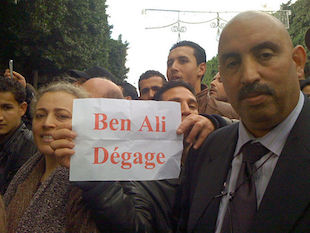NEW YORK | TUNIS – Thousands of Tunisian police rallied for pay raises on January 25, joining a growing movement of Tunisian citizens turning up the heat on Prime Minister Habib Essid with demands for “work, freedom and dignity”.
Once hailed as the success story of the Arab Spring for its democratic progress, Tunisia has become a poster child for the dangers in ignoring economic malaise, alienation and frustrations of North African youth.
Five years ago, a college graduate turned fruit vendor, Mohamed Bouazizi, ended his life after he faced abuse from police. On January 24, a copycat suicide ended the life of Ridha Yahyaoui who was refused a job. His action sparked riots in some of the same impoverished towns that brought down the previous regime.
“Ridha killed himself because he lost hope,” Yahyaoui’s father Hathmane, clutching a photograph of his son, said in press interview. “I have lost my son, but I warn the authorities, my son will be the new Bouazizi and his death with create more protests for work and dignity.”
In Kasserine, the struggling central city where the latest spate of protests began, more unemployed young men have threatened to kill themselves. Two were injured after trying to throw themselves off the roof of the local government building over the lack of jobs, according to a Reuters report.
The spreading unrest shows no signs of weakening. On January 23, the government declared a nationwide curfew from 8pm to 5am to cope with the unrest.
While the government has managed to make political reforms including a new constitution, too few jobs were created and tourism, key to jobs and income, was hurt by recent terror attacks at a beach resort, at a museum and in the capital. Unemployment hit 15.3 per cent in 2015 from 12 per cent in 2010.
Soon after President Beji Caid Essebsi unveiled a jobs program for some 6,000 youth in construction and development projects, thousands came out to register at the governor’s office.
Hard hit among the unemployed are university graduates who comprise one-third of jobless Tunisians. The loss of hope for a better future has helped Islamist militant groups recruit jihadist fighters for their ranks in Syria, Iraq and now Libya. More than 3,000 Tunisians are believed to be fighting in Iraq and Syria.
The government is also being squeezed by international lenders who want cuts in public spending and a trimming of the budget deficit. Unlike its oil-wealthy neighbors Libya and Algeria, Tunisia has few natural resources.
“We understand well the demands of protesters and they are legitimate,” government spokesman Khaled Chouket said. “But there may be attempts to infiltrate the protests to darken the name of Tunisia and undermine our democracy.” [International Press Syndicate | 26 January 2016]
Photo: President Ben Ali must leave, 14 Jan 2011 | Credit. VOA Photo/L. Bryant – Wikimedia Commons

